Selena
Shea Serrano
Selena tells the true story of the iconic Tejano singer, played by Jennifer Lopez, who broke barriers in music and fashion until her untimely death at age 23. Like Selena the person, writer Shea Serrano is also a Mexican American from Texas. When he first saw the movie in 1997, he was captivated by all the things it got right about his world — the accents, dialogue, and intimate moments. When he watches it now, he finds new lessons on parenthood in the relationship between Selena and her father, played by Edward James Olmos.
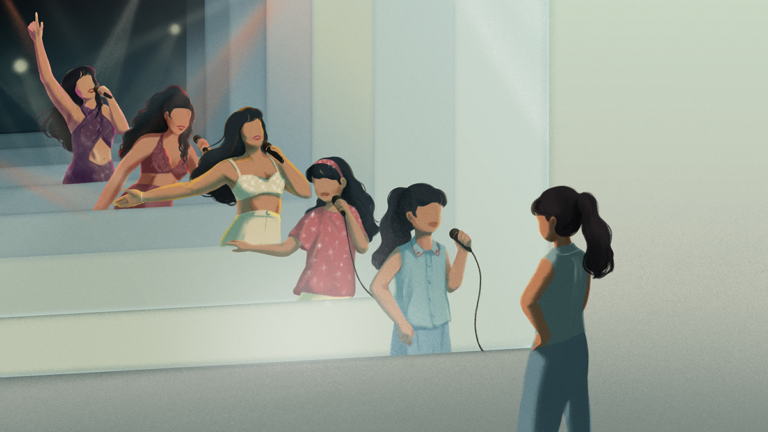
Image by Grace J. Kim, © All Rights Reserved.
Guest
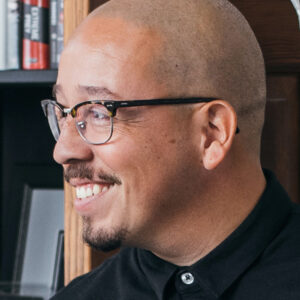
Shea Serrano is an author, journalist, and former teacher whose work has been featured in The Ringer and Grantland. He’s the author of The Rap Year Book, Basketball (and Other Things) and Movies (and Other Things).
Transcript
Lily Percy, host: Hello fellow movie friends. I’m Lily Percy, and this week, I’ll be speaking with Shea Serrano about the movie that changed him, Selena. If you haven’t seen it, don’t worry. I’m going to be your movie guide, so you’ll have all the details you need to follow along.
[music: Amor Prohibido by Selena]
Growing up in Miami, my brother and I used to watch our Spanish music videos on Univision. There was an MTV VJ, Daisy Fuentes, who would host this block of music from Latin America. And I’ll never forget the first time that I saw Selena singing “Amor Prohibido” on that channel.
[music: Amor Prohibido by Selena]
The thing that struck me watching her was not just how beautiful she was, but how very much herself she was. She was this curvy, confident Latina woman, a star in Tejano music, and for me, represented everything I wanted to be as a woman when I grew up. But I really didn’t understand how big she was until her death, until she was murdered. And that’s when I really knew the Selena that was a fashion designer, that was this key business figure in her community in Texas and also this role model in her family. That’s when I really understood the power of Selena.
[excerpt: Selena]
The movie Selena tells the story of this iconic Tejano music singer, but it goes even deeper, to tell the story of her father, the father that was also a musician — played by Edward James Olmos — who had a really difficult life, as a Mexican-American trying to play doo-wop in a country that rejected him.
[excerpt: Selena]
The racism that Selena’s dad faced when he was her age and younger, as a musician, influenced the way that he helped his daughter to shape her career. He told her to be cautious. He told her, “You know, Mexicans won’t accept you when you sing in Spanish, because you sound like a gringa, and the Americans won’t accept you because you’re Mexican.”
[excerpt: Selena]
The thing that’s so special about the movie Selena is that it shows how the daughter actually helps the father heal. Through his relationship with Selena, he comes to realize that a lot of the limitations and fears that he had for himself and for his daughter, she could break them simply by trying.
[excerpt: Selena]
I’ll admit that I never really saw the movie Selena as anything more than a vehicle for Jennifer Lopez, until I spoke with Shea Serrano. He’s a writer, and he’s also Mexican-American — from Texas, just like Selena — and for Shea, this movie really represented the kind of father that he wanted to be to his own kids. And it also set the standard for himself, whether consciously or subconsciously, that he wasn’t going to be defined or limited by anything in his life, including his own Mexican identity.
Shea grew up in a community where being a writer wasn’t a possibility. He was working-class. And for him, seeing Selena be all these things — fashion designer, business woman, singer — it meant to him that he could be more than just what he knew in his own family and community; that he could dream really big.
So I want to say that Selena the icon, the wonderful, beautiful human that she was, is in the room with us as we talk about this movie. I feel like we have to pay homage to her. And just thinking about her and having her in mind, I’d love to take you back in time for a minute, asking you to close your eyes there in the studio for about ten seconds — and I’ll keep time — and just think about that first time that you saw the movie, Selena. Think about how old you were, where you were, how it made you feel — and I’ll just chime in when the ten seconds are up.
So what memories came up for you?
Shea Serrano: Being in high school. That was a long ten seconds, by the way. I felt like it was going on — I felt like that was at least 45 seconds.
Percy: [laughs] Right? Imagine people who meditate for hours. I’m like, I don’t know how y’all do it. [laughs]
Serrano: [laughs] I was in high school, the first time I watched Selena. At that point, her legend had already begun to grow a great, great deal. And then the movie was coming out, and it was this gigantic thing in San Antonio. I can remember — and I wrote about this in the movie book. I can remember watching a news clip, one of those two-minute news videos on KSAT-12 or whatever, and they were interviewing people who were waiting in line overnight before the movie actually came out. They were camped out because they were so excited to see it.
Percy: Wow.
Serrano: And I was like, why is everybody so excited about this? I know who Selena is, and I know her music, and I know everybody listens to it, but I just didn’t understand — I didn’t understand all of the layers or parts and pieces that were involved in watching a movie like this. I thought it was just, oh, people like the music. And then you get older, and things start to change a bit, and you start to recognize — realize why people were so drawn to it; why a specific community was so drawn to it.
Percy: And how rare of a movie it is.
Serrano: Really. What’s the other movie about a Mexican-American singer?
Percy: La Bamba? [laughs]
Serrano: Yeah. [laughs]
[excerpt: Selena]
Percy: Well, and then one of the things that I appreciate is that it’s so specifically Mexican-American and so specifically Tejano. And the reason that I say that it’s so important that it’s so specific is that I really believe that the more specific you are to your own experience, the more universal you become. And one of the things in watching this movie that — even though I’m Colombian-American, I’m still Latina, and I relate to so many of the things, even though I’m not Mexican, and those aren’t my experiences.
And the character of Abraham, Selena’s father, there are things that he says in the movie that are just, I have experienced; I have felt very deeply. You know the line where he says that “the Americans jump all over us because we don’t speak perfect English. And then the Mexicans jump all over us because we don’t speak perfect Spanish”? I’ve had that experience in Colombia, [laughs] talking to my cousins. I’ve worked really hard to speak English as perfectly as I can, because of comments and criticism I’ve heard here in the States. And I’m just curious, for you, what are the moments or lines in the movie that really hit home for you, that felt like they were so true to your experience?
Serrano: That’s a big one. I think that’s the one most people grab onto first, because that scene that you’re talking about, when it’s A.B. and Selena …
Percy: Her brother.
Serrano: … and they’re in the car together — it’s dad, brother, sister, and he’s trying to download some actual insight and information onto them, something that he knows they’re going to deal with for the rest of their lives, and they’re just poking fun at him and being teenagers.
Percy: He’s trying to give them real wisdom. [laughs]
Serrano: He is. And it just — they’re going in circles in it. When you get older, you realize, Oh, this is a real thing.
I think that that’s the best version of that speech that we’ve gotten in any of those movies. You’ve seen other movies that have tried to talk about that thing, but Edward James Olmos is just such a powerhouse that he hits all of those notes perfectly; Jennifer Lopez is perfect in this scene, going back and forth with her dad; Jacob Vargas, who plays her brother, is — they all just balance each other out so wonderfully.
[excerpt: Selena]
Separate of any individual lines, there are just little things that you pick up on: like the way a word is pronounced, and you hear the accent, and you’re like, oh, I know exactly — I’ve heard this word said exactly this way before. That’s hard to do, first of all, if you’re an actor, but also, that’s a thing that a lot of people will miss, if you didn’t grow up in a certain kind of neighborhood with a certain kind of population around you.
Like when you hear the — when the mom and the dad are arguing, the first time we see Selena in the Jennifer Lopez version, and she’s wearing the bustier, or she goes and changes into the bustier during her performance, and the mom and dad are arguing about it, and you can hear in the mom’s voice — I’ve heard my mom sound exactly like this. And it just really — those sorts of little things are what keep pulling me back into the movie, you know?
[excerpt: Selena]
Percy: So talking about that scene in the car between Selena and her brother and her dad, in your book Movies (And Other Things), you tell this really wonderful story that I feel like illustrates so many of the things that they’re talking about in that scene. It’s the story of you working at — is it Cici’s Pizza? Is that how you say it?
Serrano: [laughs] Oh, yeah, Cici’s Pizza, yeah.
Percy: I’d love to read a part of it, if you don’t mind, just because it’s so well-written. And I’d love to just hear you talk about it.
Serrano: All right. Go nuts.
Percy: So you were talking about working in this pizza place, and you were there with a couple of other guys who were also Mexican-American; and they’re also Mexican immigrants, so it was a different scenario than one you had been in. And then you say, “I remember telling them that I was in school, just as a general piece of chitchat one day. And I remember them making fun of me, hand to God, for like a week straight about it. They’d say things about how I wasn’t a real Mexican, because I’d gone to college, and they’d say things about how I thought I was white, because I’d gone to college. Just a bunch of dumb shit like that. And, I mean, I wish I could tell you that I was smart enough at the time, to be able to explain to them how backward it was for them to think that only white people went to college, and that the heat from the pizza ovens bonded us in unexpected and very meaningful ways, and that they both ended up enrolling at the school where I was enrolled, and we all graduated together and advanced our family names. But that’s not how that particular situation played out.” [laughs]
Tell me a little bit about that experience and how you connect it to Selena.
Serrano: OK, so the scene we’re talking about is the thing about your having to balance, basically, two identities. As you mentioned, this was my second or third year in college, something like that, just trying to make my little minimum wage money so I could spend it on whatever. And I met those guys — we were all working, making the pizzas, throwing them in the oven together — a couple of Mexican dudes, and I thought we were gonna be buddies. I was living — this was in Huntsville, Texas. The school up there didn’t have a very big Mexican population. I was excited that I was like, oh, I remember these faces. This feels a little bit like San Antonio.
And then they started laying into me about being a college boy. And I remember having that exact same conversation before I even left for college. My friends, people I had grown up with, were like, “Oh, you’re abandoning the neighborhood” or whatever. “You should be working down the street, not going to college” — this whole thing. So that just always stuck with me.
And then, as you mentioned, it didn’t work out great for me. I ended up being the worst of the group because what ended up happening was, one of the guys there, his last name was very similar to my name, and they mixed up our paychecks one day, the payroll did. And he was working full-time, and I was doing part-time college hours, ten hours, five hours a week or whatever. And I got his check, and it was for $480-something, 500 bucks or whatever, and I just kept it. [laughs] I just cashed the check — it had my name on it — and I quit the job, and I left, and that was it. And I can remember thinking, I wonder if they thought this was a cool “Mexican” thing to do; if they — did they approve of that? It was all backwards. It was all turned around. It was all really dumb. But that’s just the sort of stuff that happens in your brain.
Percy: How did you come to make peace with that, though, the idea that you could be educated and still be Mexican and still be true to your family, your community?
Serrano: I think that’s the very first time anybody has ever asked me that question. And I don’t know that I have a very good answer for it, because that’s still very much a thing. That’s a thing that I think about a lot; that’s a myth that is still out there. I do a lot of speaking engagements at different schools, and that’s always the primary point we’re trying to get across to these kids, is, being Mexican doesn’t mean not being able to do certain things. It doesn’t mean anything except that you’re Mexican.
So it’s still something I think a lot about. I live in a neighborhood now, there’s like our little cul-de-sac, there’s not another Mexican family in there. That part of town, there’s not a lot of Mexicans on that side of town. You feel it in certain spaces, in certain rooms. So I don’t know how to deprogram my own brain, let alone somebody else’s, from feeling that way.
Percy: I relate to that a lot. I think, when you are different from either the community that you come from or even just have different jobs than your family members, and different experiences, it’s so hard to reconcile your desire for something different from what they experienced.
Serrano: Yeah, because you have enough conversations with your people — my dad, for example, he drives a bus for the city. He’s been there for 33 years, going on 34 years. He’s getting up every morning at 3-something, riding to work, and then driving a bus for ten hours and then going home. My mom worked at a corner store for 29 years, just at a Stop-and-Go or whatever. My uncle does landscape and irrigation. These are hardworking jobs. And I sit down at a table with them, and they’re talking about work, and I’m like, “Oh, I sat in my office and played on the internet for six hours, and I went to go watch a movie.”
And that’s what my job looks like, and it looks so much different than theirs. And there’s always — I don’t know if I’m putting this tension in there myself or what, but when you’re in a space where people are not doing the same sort of thing that you’re doing, it does sort of tint the relationships a bit.
Percy: It makes it so complicated, because it can be seen as rejection of them and of who they are and what they do, unintentionally.
Serrano: They can be feeling that way, I can be feeling that way, we can all be feeling a certain kind of way and not being able to explain it exactly, but we know that it’s there.
Percy: Well, and I think this is the tension that happens, particularly with folks who immigrated to the U.S., but particularly with Latinos, in this case. It happens in Selena, in the movie. We see her mother talk about moving to this house in a predominantly white neighborhood and why that was so important to her, and then the tension that comes from, for her father, of watching her have experiences that he experienced, and then experiences that he didn’t experience, and the tension that always exists in wanting the best for your kids and wanting them to do better than you; but what does “better” mean?
Serrano: Exactly. I think the only thing everybody sort of agrees on is that “better” means “more money.”
Percy: [laughs] Exactly.
Serrano: But beyond that, we have no idea.
[excerpt: Selena]
I mentioned I have kids, and my two youngest are twin boys. They’re 12 years old now, so their little lives are starting to take shape, and you’re starting to see what type of young men they’re going to become, what type of men they will eventually become, and I’m wondering a lot of these same things, myself. They have grown up just so differently than I did.
I’ll give you a perfect example. My youngest kid, he’s seven, just turned seven — he plays T-ball. And we went to a T-ball game one day, and we were running a little bit late, so we park in the back of the field. And rather than run all the way around, because you have to get there at a certain time or else they mark you off the roster, and you don’t get to play. So we were all hustling, and there was a gate, it was maybe three or four feet high, and I was like, “We’re just gonna jump the gate and go.” And jumping gates is a thing that I just did — you do with your friends, growing up, running around in the neighborhood. And we did it — I did it. I put the little one over. And the two twins, it was the first time they had ever been tasked with jumping a gate, is what it seemed like.
Percy: Wow.
Serrano: And they had no idea — “Where do my feet go? How do I get over the top?” It was a thing. It was an actual thing. And I can remember, I was laughing about it and being like, “Oh, haha, you’re like the rich kid in the group now. Hahaha.” And he’s like, “Well, that’s not—”
Percy: Except they’re your kids! [laughs]
Serrano: And he’s like, “That’s not — you’re making fun of me by saying I’m rich? That doesn’t make sense to me in my head, Dad. That’s a good thing, I thought.” You know what I’m saying?
Percy: Of course.
Serrano: Everything is just all spun around.
Percy: Well, this is also reminding me about something that had occurred to me yesterday, watching this movie again, was that Selena was such an inspiration for all of us because she was so determined not to let anyone tell her who she was or who she could be. She could sing in Spanish and English. She could be an international star in the music industry. She could be a fashion icon and design clothes that she wanted to see that weren’t being designed at the time, for bodies like her; for her community. You said this in your Grantland article, explaining Selena Day to people. [laughs] You say, “She was very, very, so clearly, very good at her job. And it was a job that wasn’t something Latinos were known for doing.”
And thinking about her, I started to think about you and your own career and how much you really resemble her. You really have done the same thing. And I’m just curious, has that ever struck you? I don’t know if she unconsciously inspired you, but I feel like you have also — within your writing, within your work — explored topics that no one else was talking about and nobody else elevated.
You’re even trying right now — I don’t know where you’re at in creating this TV show — you want to create a TV show because there is — like you said on Twitter, there just aren’t any Mexicans on TV, and you got tired of waiting for it. So I’m just curious if she’s been influential to you in this way, in being someone who just didn’t accept other people’s definitions of what she could be.
Serrano: She has absolutely been influential in that way, but I think it would be a gigantic overstatement to compare anything I’ve done to anything that she has done. You’re talking about a world figure at this point.
Percy: I get to say it, at least, then. [laughs]
Serrano: You can say it; I will never, ever, ever say that. But you do feel that. You watch the movie now — I’ve seen this movie, I can’t even count how many times I’ve seen it. But there’s always a new little thing you pick up on. Like when I re-watched it just yesterday — I always forget about the clothing angle, because they touch on it very briefly; there’s the scene of her with — I think it’s Deborah — they’re sitting on the bed, drawing stuff together and talking about the clothes.
And then she has a quick little line, when she’s with Chris, about — she’s talking about the way she wants her life to turn out, and she wants people singing her music and wearing clothes that she’s designed. And I always forget about all of the different things she was doing. And if you read through her Wikipedia page, there are just so many “this was the first time that this happened; this was the first time that this happened.”
Percy: Such a pioneer.
Serrano: And so, it to me feels like it would be impossible to watch that, to learn that stuff and not feel at least a little bit inspired. Absolutely.
[excerpt: Selena]
Percy: I’m curious, because you’ve mentioned that you have kids, and you have kids who, obviously, you watch movies with. Is this a movie you’ve watched with them?
Serrano: We haven’t watched this one, no. They’ve listened to her music. This is — you know, where we are in our relationship right now, we are at the point where the stuff that I do is no longer cool, for the older ones. So if we get in the car, and I put on Selena Live! or whatever, I put on a Selena album, they’re in the back, rolling their eyes. That’s where we are.
Eventually, we will watch this movie — probably when they get a little bit older, because it does feel like one where they’re going to — we’re going to springboard from this into some conversations I’m excited about having with them about that part of their identity, because they’re half-Mexican-American, my wife is black, so we’re just right in the middle again. And we’re now in the middle of being in the middle, you know what I’m saying?
Percy: No kidding.
Serrano: So this will be on there, but this is not a movie that I wanted to just put on there, haphazardly, like you would a Home Alone-type movie. I want to put this one on with a lesson plan in place afterward. And I figure, this stuff started making sense to me in my brain during high school, so we’ll probably do it two years from now or something like that.
Percy: That makes a lot of sense. You have to have the intention and the audience that’s willing to hear it.
Serrano: You gotta have all of that, and I’m excited to — we’re talking a lot about Selena; we haven’t spent a great deal of time talking about just how good of a movie this actually is. It’s just so well done. There’s so many little flourishes in there that make it fun. One of my favorite things that they do in here — you were talking about lines, earlier, that stick out. One of the ones that sticks out to me is when they have that famous shopping scene, when they’re trying the dress on, and she’s going back and forth with the saleswoman.
Percy: She’s on her way to the Grammys, and she’s trying to find her Grammys dress.
[excerpt: Selena]
Serrano: It’s her and Deborah, and they’re trying to find the thing, and they need something to signify how big of a person Selena is. And so the way that they do it is, they have her reaching into the dressing room, helping Deborah with the dress.
[excerpt: Selena]
And then a guy walks by. And to this point, she’s only dealt with white people in the store, but this is clearly a —
Percy: Who pretty much assume she’s gonna rob them. [laughs]
Serrano: Yes, yes, yes.
Percy: They’re like, “There’s no way that she can buy a dress that’s $800.”
Serrano: And then you see this guy, and he’s Mexican, Mexican-American, some version of that, and he gets so excited, and he can barely talk.
[excerpt: Selena]
He finally, after three or four tries, he drops all of his boxes and he says, “Selena está aquí.”
[excerpt: Selena]
And they don’t translate it. There are only a couple of times in the movie where somebody speaks Spanish and they translate it for you. But you don’t need it. Even if you don’t speak Spanish, you understand: he, right there, is saying, “Selena is here.” And he’s freaking out.
And then they cut straight from that: he takes off running, shouting it; and then we get a bunch of scenes of people in the mall, but we’re not just seeing shoppers. We’re seeing the people who work in the mall, in the backgrounds. We’re seeing the stockers or the janitors, cooks, all of these —
Percy: Everyone rushing, rushing to get to where she is.
Serrano: That’s a good segue into a conversation about the spaces that, at the moment, we are allowed to exist uninterrupted, versus where we would like to be allowed to exist uninterrupted, you know what I’m saying?
[excerpt: Selena]
Percy: I’m curious, since you’ve seen this movie now over so many different stages in your life, I’m curious what you’re getting from it now that you didn’t get previously, just as you’ve gotten older and you’ve continued to learn as a person in this world, just watching it.
Serrano: The thing that I get now, more than anything else, is I understand where Edward James Olmos is coming, as a father, because I’m now a father of children. So there’s that part that really is inside of my brain. There’s also just a real sense of pride, watching it, that — again, when I watched it when I was 15 — when you’re watching a movie when you’re 15 or 16 years old, all you’re looking for is the cool stuff. And this movie is not built up to give you a bunch of those types of “cool” moments. You have the shopping scene moment; that’s really cool, when you’re like, “Yeah, stick it to her,” because you understand —
Percy: But so much of it is just these intimate family moments.
Serrano: Yeah, and that’s not —
Percy: That’s not cool. [laughs]
Serrano: When you’re 15, 16 years old, that’s not a cool thing. When you’re 38 years old, which I am now, and you’re watching this family interact, and you’re watching them move through the world together, and you’re like, “Man, that’s really wonderful. This is a very touching story.” Even when — you know every movie is going to have a big conflict, the big fight. And they set it up — very early on, there’s a close connection between Selena and her father, and you’re like, OK, well, when the fight comes, it’s definitely going to happen between these two, because that’s the biggest punch to throw. And then it does happen, and you’re watching it, and you’re like, “Oh, God. I knew it was coming, and I knew they’re gonna fix it later on, but it’s really” —
Percy: Over the long-haired guitarist. [laughs]
Serrano: Yeah, yeah, yeah. “This really hurts to watch.” But little things like that.
Percy: I love that you mention the father and coming to see him differently, now that you’re a father, because even though I don’t have kids, I’m your same age, and I look at him and his character much differently now than I did when I first saw this movie, as a teenager, because now I understand — back then, I think I saw him as strict and actually kind of controlling. And now what I see is, boy, he loved her so much. And because he loved her so much, it’s why he was so intentional with her and so vulnerable. He revealed so many things to her that you actually don’t see him reveal even to his own wife. And that relationship, to me, is so beautiful and really stands out when I watch the movie now.
Serrano: Edward James Olmos is fantastic in this role. He has just a natural sort of dad energy about him.
Percy: He does.
Serrano: And we saw him flex it the first time in Stand and Deliver. He was a teacher in that movie, but in this one, we’re getting to see him be the actual dad, and you’re like, I understand. We get to see why he behaves the way he behaves: that’s why they do all that early stuff in the movie, where we see him trying to chase down his own music career and they turn their backs on them, both white America and Mexican America; they’re both just like, “This isn’t working out for us.” And he understands that.
He can remember — you can tell he remembers what that felt like, and he’s caught in this weird spot where he recognizes that his daughter is this transcendent talent, and he wants to be able to present that to the world, but he also knows how shitty the world is. And he’s doing this very delicate tightrope walk, trying to keep her as safe as possible. And then they finally have their big breakthrough, and he realizes — he admits to her, “I’m afraid to lose you. I don’t know how to let you go.” And he has to understand that she’s stronger than he ever could’ve been, and she’s going to be just fine, and they have that great whole scene. He’s really great.
Percy: He’s showcasing what the best parents have to do.
Serrano: Yeah. As a parent, your job is to make some mistakes, and then your kids fix your mistakes for you. That’s how that works. When I was a kid, I thought it was the other way — I thought the kids were supposed to screw up, and the parents fix it. But I’ve come to realize that that is not how that works. My job is, I’m trying to do the right thing, and I know I’m gonna do it wrong, and then my kids will show me the right way.
Percy: And then hopefully you’ll end up with a kid like Selena. You never know. [laughs]
Serrano: Hopefully, my little T-ball player is the next José Altuve. Who knows?
[excerpt: Selena]
Percy: Shea Serrano does many things, but he’s best known as a staff writer for The Ringer and as a New York Times bestselling author. His books include Movies (And Other Things), Basketball (And Other Things), and a rapper coloring and activity book, co-made with Houston rap legend Bun B.
Q productions and Esparza / Katz Productions produced Selena, and the clips you heard in this episode are credited entirely to them. Warner Brothers distributed the movie, and EMI released its soundtrack.
Next time on This Movie Changed Me, it’s our final episode. And it makes my heart so happy to say goodbye with a movie that I cherish deeply, Love & Basketball. I’ll see you on the court.
[music: Bidi Bidi Bom Bom by Selena]
The team behind This Movie Changed Me is: Gautam Srikishan, Chris Heagle, Eddie Gonzalez, Lilian Vo, Christiane Wartell, Tony Liu, and Kristin Lin. This podcast is produced by On Being Studios, which is located on Dakota Land. We also produce other podcasts you might enjoy, like On Being with Krista Tippett, Becoming Wise, and Poetry Unbound. Find those wherever you like to listen, or visit us at onbeing.org to find out more.
I’m Lily Percy. And remember — don’t limit yourself or your dreams, or let anyone take them away. As Selena said, “the impossible is always possible.”
[music: Bidi Bidi Bom Bom by Selena]
Books & Music
Recommended Reading
The On Being Project is an affiliate partner of Bookshop.org and Amazon.com. Any earnings we receive through these affiliate partnerships go into directly supporting The On Being Project.






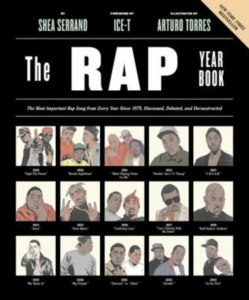
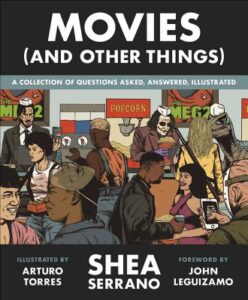
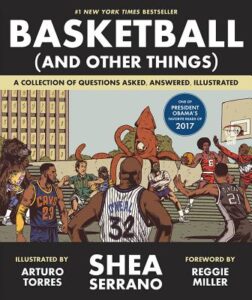
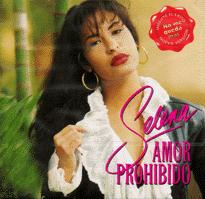



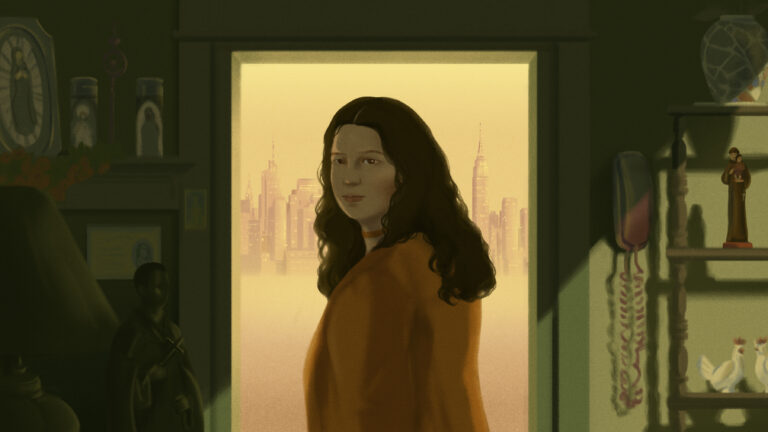
Reflections